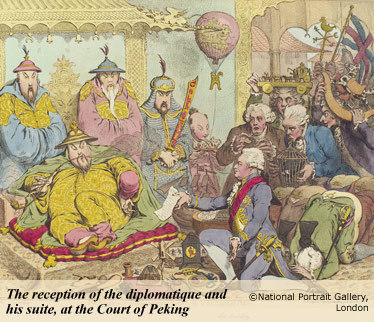01229 585 778 | admin@ulverstoncouncil.org.uk
Ulverston Town Council Office, County Square, Ulverston, Cumbria LA12 7LZ
First British Embassy to China
Sir John Barrow’s mastery of Chinese led to his first advancement in public life. Recommended to Lord Macartney by Sir George Staunton he was appointed official interpreter to the 1792-94 expedition to China; the first ever British embassy there.
British traders felt confined by a restrictive trade system and lobbied for an embassy to go before the Chinese Emperor in an attempt to gain greater trade rights.
Requests made during the expedition included:
Ultimately, the embassy was not successful in its task. This was not due, as is commonly believed, to Macartney’s refusal to adhere to the tradition of the Imperial Chinese Court and bow in the presence of the Emperor, but rather a result of competing world views.

The embassy arrived at Peking with gifts representing all the wonders of western civilisation – artillery, telescopes, a coach and four horses, a balloon and pilot. These were met with disinterest and contempt by the Chinese Emperor who replied definitively that his country had never valued ingenious articles and had no need of Britain’s manufactures.
Although the Macartney embassy returned to London without obtaining concessions from China, the mission was deemed a success as it brought back new and detailed observations.
Assisting Sir George Staunton with the production of the official expedition account, Sir John Barrow also published an account of his travels. This was soon acknowledged as the most valuable and interesting description of China and the Chinese of the era.
Protecting trade routes to India
In 1795, following France’s occupation of the Netherlands, (mother country of the Dutch East India Company), Britain had taken control of the Cape Colony to prevent French attempts to establish trade routes to India. In 1797, Sir John Barrow, acting as private secretary to Lord Macartney, accompanied him on an important and delicate mission to establish government in the Cape.
Entrusted with the task of reconciling the Boer settlers with the native black population, he was also charged with reporting on the vastly unexplored interior of the country.
Sir John Barrow excelled himself. He conducted the first Cape Colony census, mapped parts of the interior as far as the River Orange in Namibia and even contrived an interview with Shaka, King of the Zulus, whose army would later throw southern Africa into disarray.
In 1799, Sir John Barrow decided to settle in South Africa. He married Anne Maria Trüter, daughter of a Stellenbosch judge and bought a house in Cape Town.
With the situation improving in the Netherlands and the Peace of Amiens treaty signed in 1802, the British handed the colony back. This upset Sir John Barrow’s plans and he promptly returned to Britain.
Arriving in London, he published his ‘Travels into Southern Africa’ and in 1803 was appointed Second Secretary to the Admiralty, a position which would see Sir John Barrow become a name of influence in nineteenth century British exploration of Africa and the Arctic. In his lifetime Sir John Barrow took part in numerous diplomatic missions. Pioneering and fraught with danger, they were of extraordinary importance and became andmarks in British History.
Can't find what you are looking for? Search the site...
Call: 01229 585 778
Email: admin@ulverstoncouncil.org.uk
Ulverston Town Council Office
County Square
Ulverston
Cumbria
LA12 7LZ
PRIVACY | COPYRIGHT | USING THIS SITE | SITEMAP
Website designed by furness.media